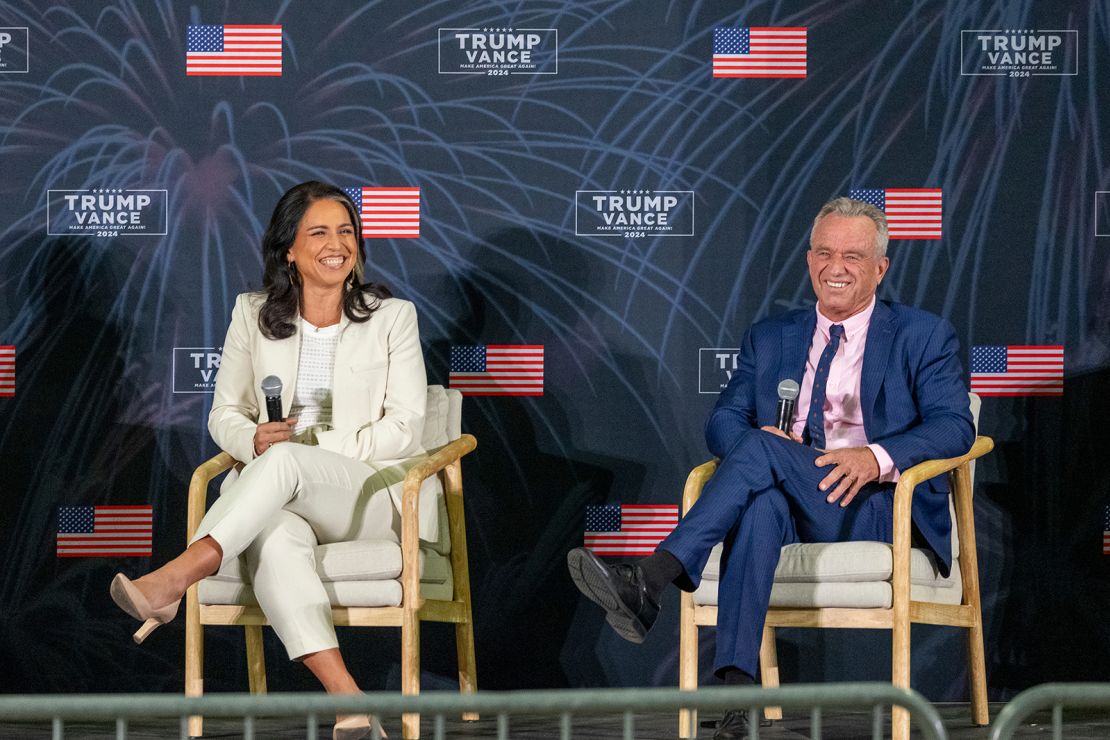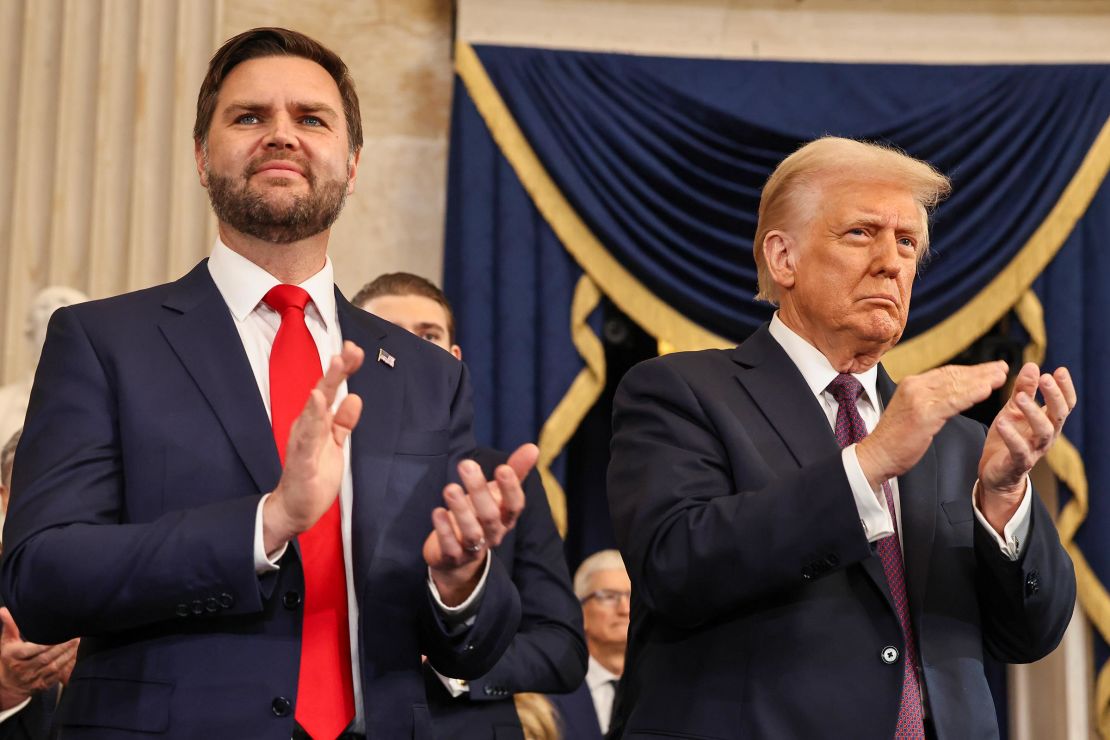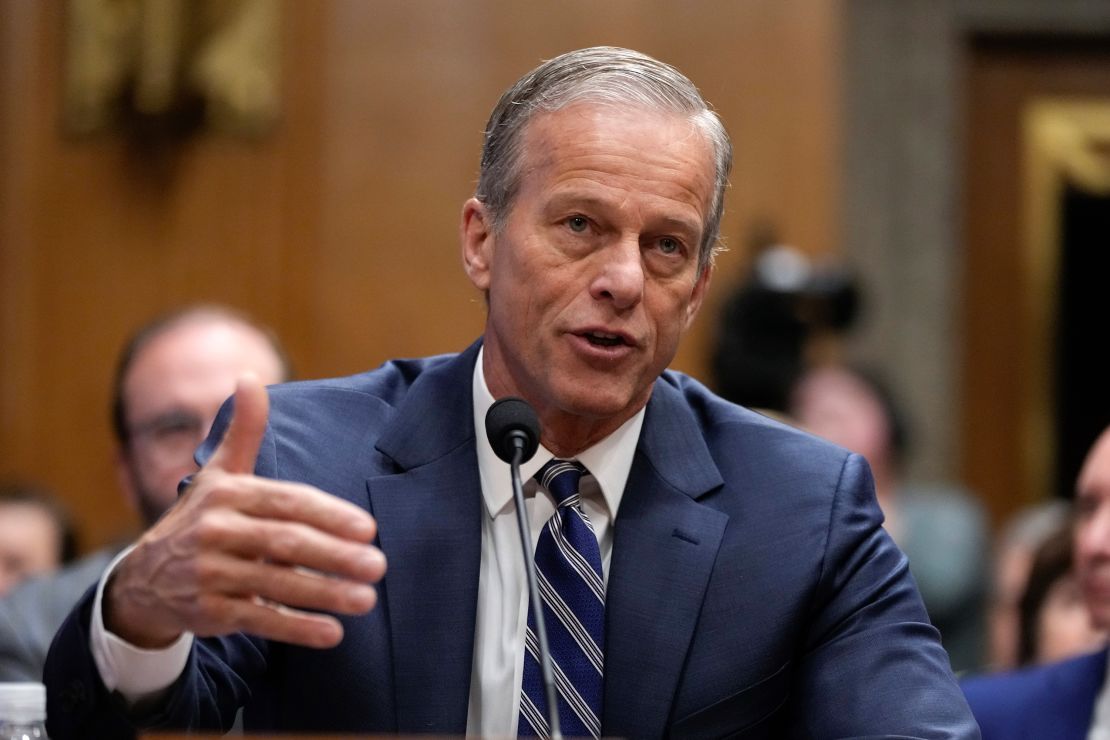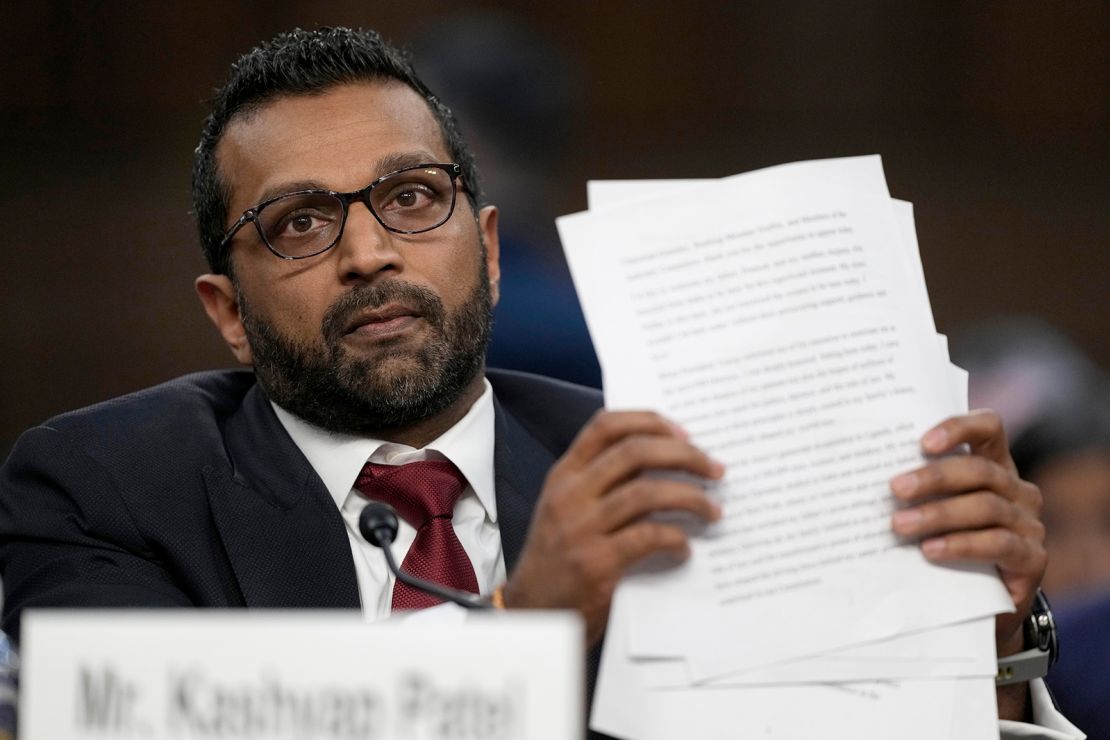CNN
—
Sen. Todd Young didn’t back Donald Trump in 2024. But that didn’t stop Young from calling the president this past weekend as he was wavering over Trump’s pick for the country’s top intelligence official, Tulsi Gabbard.
Trump told Young to “vote your conscience,” the Indiana Republican told CNN.
And when Sen. Thom Tillis was considering a no vote on Pete Hegseth to be defense secretary last month, Tillis spoke with Trump and relayed his concerns about new allegations that emerged ahead of the Senate vote.
“I made it very clear that if, on their face, they proved to be accurate, that I was a no,” Tillis said in an interview. “I told President Trump. We had a great discussion. It’s actually comical how people think it went versus how it went. I was treated with the utmost respect.”
Two of Trump’s most controversial nominees, Gabbard and Robert F. Kennedy Jr., won key committee votes Tuesday with the support of all Republicans, the clearest sign to date that the president is poised to get all of his Cabinet picks confirmed after Hegseth was approved last month by the slimmest of margins.

The White House ultimately won over skeptical GOP senators – not with Trump’s usual bombast, but with a combination of Trump’s personal conversations with senators, extensive engagement from Vice President JD Vance and assurances from nominees that their past controversial views would not drive their positions in Trump’s Cabinet.
Trump’s softer personal touch with senators in private contrasts with the not so subtle threats from the president’s allies outside the White House that any GOP senator who dared defy him would face significant political consequences.
Trump asked for updates – often hourly ones – and spoke to a handful of senators about the strength of his Cabinet, according to one source familiar with the matter.
“I think we’ll do well. We have great, great people coming in,” Trump said Monday in the Oval Office, when asked by reporters of his lobbying efforts to senators. “I think we have the finest people ever recruited for government.”
Tuesday’s votes underscored the degree to which the Trump White House has been able to keep Republican senators in line throughout the confirmation process, minimizing dissent even as his administration attempts an historic overhaul of the federal government.
Interviews with more than a dozen officials in the White House and on Capitol Hill offer insight into the various levers the White House was able use to persuade uncertain GOP senators to stick with Trump and support the president’s most controversial nominees.
A quartet of Trump’s nominees – Hegseth, Gabbard, Kennedy and Kash Patel – initially appeared to be a heavy lift to confirmation. Hegseth is confirmed, and the other three appear well on their way, with floor votes expected soon for Gabbard and Kennedy and virtually no Republican opposition emerging for Patel.
Sen. Bill Cassidy, a Louisiana Republican and doctor, said last week he was “struggling” with Kennedy’s nomination over his vaccine skepticism. While Trump didn’t call Cassidy – one of the seven Republican senators who voted to convict him in the 2021 impeachment trial – Cassidy spoke at length with Vance, citing the vice president’s “honest counsel” in his statement supporting Kennedy Tuesday.
Trump has now confirmed 11 nominees in the first 16 days of his administration, a number nearly double what the Senate had confirmed for President Joe Biden and Trump’s first term.
Those closest to Trump have long believed that successfully pushing his nominees through the confirmation process would be a crucial early test of his strength on Capitol Hill, multiple sources familiar with the strategy told CNN.
After Trump’s first attorney general pick, former Rep. Matt Gaetz, quickly blew up –something Trump’s team internally recognized was bound to happen after he faced an immediate backlash from multiple GOP senators – many people close to Trump felt that they had to aggressively mobilize to prevent another top pick from failing.
Or as one Trump official put it: “Getting GOP lawmakers to fall in line.”
Vance provides vibe checks

Vance, who spent two years in the Senate before becoming vice president last month, has played a central role in keeping Trump’s nominees on track.
Vance spoke privately with Cassidy and Young, among other skeptical Senate Republicans, in recent days to shore up concerns about RFK Jr. and Gabbard, two sources familiar with the talks told CNN.
Vance’s main task during the transition process was to serve as Trump’s point person on Capitol Hill. The president directly tasked Vance with helping to get his former Senate colleagues-turned-nominees confirmed.
While Vance hasn’t developed longstanding relationships on Capitol Hill during his abbreviated time in the Washington, many Senate Republicans are now looking to Vance for insight into the president and his administration’s internal thinking – especially as it relates to Trump’s Cabinet picks.
“Republican lawmakers are calling him, and he’s calling them of course, but many of them call him to get a vibe check on where the president’s head is at,” one of the sources said of Vance.
“He’s quickly developing a role as a trusted broker between Republicans and the White House,” a second source said.
Early test for a new Senate majority leader
The tone for Trump’s Cabinet nominees was set by Hegseth’s confirmation fight.
As allegations of sexual misconduct and excessive drinking began mounting in late November and early December against Hegseth, Trump began considering other potential nominees.
Transition officials were adamant that Hegseth should stay quiet as allegations swirled. But a source familiar with Hegseth’s confirmation strategy said that he defied that advice after press reports surfaced suggesting that Trump could replace him with Florida Gov. Ron DeSantis, and both Hegseth and his lawyer, Tim Parlatore, did a series of media appearances.
Trump eventually posted on social media that he was sticking with Hegseth – and the MAGA political operation kicked into high gear, focusing attention on a handful of skeptical GOP senators, particularly Sen. Joni Ernst of Iowa, who was concerned about both the allegations and Hegseth’s comments about women serving in combat.
After multiple meetings with Hegseth, Ernst got on board, and the nominee cleared the Senate Armed Services Committee. But Hegseth’s confirmation hit another snag three days before the full Senate voted, when his former sister-in-law submitted an affidavit alleging he was “abusive” toward his ex-wife.
The new allegation threw Tillis’ support for Hegseth in doubt. The day before the vote, Tillis was telling “everybody” that he was a “no” subject to additional due diligence, and if the vote was held that day, he’d be a “no,” according to a source familiar with the discussions. That included conversations with other senators who ultimately voted against the nomination, like former GOP Senate leader Mitch McConnell and Republican Sen. Susan Collins of Maine.
Tillis delivered the message directly to Senate Majority Leader John Thune the night before the vote, making clear that Hegseth’s nomination would fail were it to move forward based on the information he had at that moment.

For Thune, less than a month into his new job as majority leader, it marked a major test.
A delay – something Tillis and some of his colleagues privately suggested – would give Hegseth allies more time to rally on his behalf and ramp up pressure on holdouts.
But Thune was resolute: The vote wouldn’t be delayed. And if senators had concerns, they needed to communicate them directly to the White House.
Thune and his leadership team didn’t frame their response as an ultimatum. Instead, they made clear they would stay in close contact with Tillis – unless he was talking to Trump, Vance or Hegseth – in a unified effort to get him to “yes.”
That’s exactly what happened over the 24 hours that followed, as Thune, his leadership team and White House officials participated in a flurry of conversations with Tillis and connected him with anyone who could provide information to help their cause. That included Hegseth himself, one source said, which eventually helped Tillis get to yes.
The person described some of Tillis’ other conversations, including one with the White House, as “low temperature,” something that the source said went a long way to de-escalate things at a critical moment.
Tillis said that he ultimately voted for Hegseth last month because he did not find anyone to directly corroborate an affidavit from his former sister-in-law, Danielle Hegseth, that accused Hegseth of being “abusive” toward his second wife, Samantha Hegseth. Pete Hegseth has denied the allegations.
Three Republicans – Collins, McConnell and Alaska Sen. Lisa Murkowski – voted no. Vance broke the 50-50 tie to confirm Hegseth.
‘I had a lot of leverage’
After last week’s confirmation hearings, Trump officials were more concerned about Gabbard than any other nominee, CNN previously reported.
She refused to directly answer multiple questions from Republicans asking her to condemn Edward Snowden, the National Security Agency leaker, after Gabbard sponsored legislation in Congress to give him a pardon. And at one point, she said she was “offended” by a question from a Republican senator asking whether Russia would “get a pass in either your mind or your heart.”
Following the hearing, Gabbard met privately with Republicans to alleviate some of their concerns.
Young, a former Marine intelligence officer, attributed a large share of his decision to support Gabbard to the influence of Vance specifically. Both men served in the Marines, represented midwestern states and generally have had a working relationship in the Senate. Young told CNN that his and Vance’s relationship deepened over the course of the nomination process, and said Vance was one of the most effective communicators in patiently convincing him that Gabbard was the right person for the job.
Young said that he received written assurances from Gabbard disavowing her past statements about Snowden and protecting leakers of classified information.
“I had a lot of leverage, and I was aware of the leverage that I had, and I used it to good effect,” Young said.
Like Young, Cassidy received specific assurances from Kennedy before he agreed to support Kennedy’s nomination to run the Department of Health and Human Services.
Over the past several days, Cassidy spoke to both RFK Jr. and Vance as he ultimately got to yes. He said Tuesday that Kennedy told him he would have input in hiring at HHS and made a commitment not to remove Centers for Disease Control and Prevention statements on its website stating that vaccines do not cause autism.
“Mr. Kennedy and the administration committed that he and I would have an unprecedentedly close collaborative working relationship if he is confirmed. We will meet or speak multiple times a month,” Cassidy said.
Like Gabbard, Kennedy still has to clear the full Senate before confirmation.
‘Resigned to the fact’

Democrats had believed that Patel, a staunch Trump loyalist and the president’s pick to be FBI director, would be controversial, like Kennedy and Gabbard. They pointed to the refusal of Trump’s former Attorney General Bill Barr to allow Trump to install Patel as FBI deputy director in his first term.
Patel has a lengthy record of public comments about how Trump would use the Justice Department to go after the president’s enemies. His comments came up multiple times during the hearing for Pam Bondi to be attorney general and were expected to be a focal point of his much-anticipated hearing.
Patel prepared for his confirmation hearing by practicing answers to questions about his record, according to a source familiar with his preparations. Inside the Patel camp, there were differing opinions on how to handle questions about what his critics call his “enemies list,” a list of 60 alleged “deep state” officials he included in an appendix of his book.
Some advisors encouraged Patel to express regret about those remarks in the same way some Biden Justice Department officials did when confronted with negative comments they made about Republicans during their confirmation hearings. In the end, Patel didn’t apologize but downplayed the list as a “glossary” in his book.
He also attempted to parry other statements Democrats raised by suggesting they were partial quotes that lacked context.
While Patel’s hearing included several contentious exchanges, it was nowhere near as heated as his advisors anticipated. No Republican senators have expressed serious concerns about Patel’s nomination in the days since.
One adviser believed that by the second round of questioning, Democrats appeared “resigned to the fact that he was getting confirmed.”


